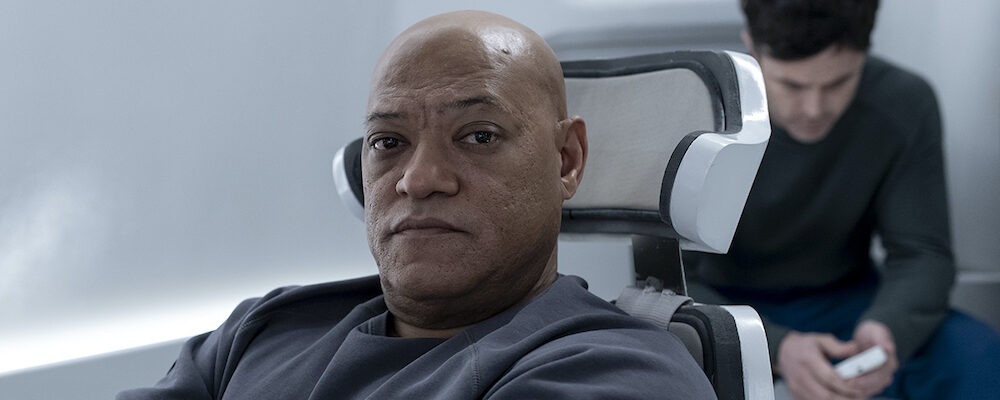‘Slingshot’: Confounding Psychological Thriller Floats Slowly Past the Point of No Return
Tony Sokol
In space, no one can hear you talk to yourself, except the commanding officer. In space-travel films, these level-headed ship captains are the most trustworthy. Director Mikael Håfström’s “Slingshot” breaks the chain of command by focusing on the incalculable effects of long-term isolation. All action takes place aboard a spacecraft en route to Saturn’s moon Titan, the Odyssey, possibly even the flashbacks to Earth. The journey is long, and the far reaches of the solar system prove to be a trippy destination.
This speculative science fiction thriller stars Casey Affleck as John, an astronaut waiting a lifetime for a mission like this. Along with Captain Franks (Laurence Fishburne), and the scientist Nash (Tomer Capone), John sleeps through most of it. The crew is kept in a drug-induced hibernation for month-long cycles, awakening to perform scheduled duties, such as regular psychiatric evaluations. The drugs which induce hibernation contain side effects. A computer voice reads off the warning label as each astronaut wakes from the cycle. Pharmaceutical ads can be heard in space. The listed dangers are understated.
Everything is understated in Håfström’s interstellar odyssey, except the view of Saturn. John and Franks even share a cupful of the captain’s homebrewed moonshine to toast the occasion. Any discussion of the insidious effects of the hibernation drugs is shut down as paranoia, which is not officially listed as a harmful side effect, but increasingly assumed by all onboard. The astronauts play it cool throughout, which increases the suspense, but only incrementally. Each under-evaluation of possible damage to the capsule brings subliminal mistrust to the screen.
The main action occurs during a mutiny, with John as an ineffective middle man. His judgment is also suspect, awakening to hallucinations, and hearing in the ship’s hallways the voice of Zoe (Emily Beecham), who dates John in flashback sequences, but kept things professional because she also works for the space program. Just before the mission, Zoe says she loves John, but he only has eyes for Saturn. Beecham does much with what little she is given, watching a lot of exits. Zoe’s only long-term commitment is her job.
Top of every class as a Naval Graduate, John is the perfect candidate for the isolated mission. He is a studious loner who has no friends. His dad died when he was young, his mom lives in Maine, and hasn’t kept in touch. John may mourn Zoe or give her no consideration. John is also emotionally removed from Zoe, by design, and training. The flashbacks to the relationship carry their own narrative arc. John and Zoe’s story is never completely trustworthy, yet contains the only incidents which can be trusted as reality. Until the entire romance is questioned. Then it becomes a military problem, based on the best-known science, which appears to make sense when Captain Franks explains it.
This intrigue reverberates during unrelated crises. The drugs help the guilt eat away at the surprised-to-be-lonely astronaut during the long flight, yet he is the only character to relate to. John’s sanity is questionable, which skewers the relationship into uncharted territory. The incidents are reported by an unreliable storyteller.
Affleck may star in “Slingshot,” but Fishburne commands it. He brings not only his incredible theater and motion picture veteran gravitas to the role of Captain Franks, but his science fiction credentials, including “Event Horizon,” “The Matrix” and the upcoming “Megalopolis.” The captain seems completely within accepted military guidelines when the statutes come out of Fishburne’s mouth. But the crazy stuff the captain is actually doing isn’t covered in the regulations. Capone’s insubordination as Nash is disquietingly effective. The data collection analyst is understandably worried. Captain Franks will not budge on his “complete the mission at any cost” stance. Nash believes the inevitable objective is a suicide mission.
Only Nash questions why Franks brings a sidearm into the galley. He too is affected by the drugs. It is no wonder John considers the alternatives. Affleck implodes several times as John anguishes over loyalty, but for the most part plays it flat, with no emotional connection except the job John was chosen to do. Everything else appears intangible. Training does not apply.
Captain Franks is the most openly dubious figure on the capsule. He just wants a friend who understands what he really means when he sings, “Please don’t let me be misunderstood,” whether he is brandishing a firearm or not. “Slingshot” captures John’s desperation and Affleck’s muted reactions muddy the anticipated calculation. But when he sleeps it off, the problems are still fresh. Some of the eroded trust is technological, which is one of many nods to Stanley Kubrick’s “2001: A Space Odyssey,” an unidentified object collided with the spacecraft causing structural damage, but the internal systems report shows no incident. Additionally, the crew loses communications with mission control.
Screenwriters R. Scott Adams and Nathan Parker do not give much detail about the mission itself. Global warming is a growing concern on Earth, and the seas on Saturn’s moon are made of methane. This will be drilled and sent back to earth, the logistics of all this is never explained. The maneuver which gives the film its title, the slingshot, doesn’t actually make sense in the Houston Control’s scheme.
“Slingshot” does not have to move through interstellar travel to make its point. Claustrophobia exceeds the boundaries of enclosed space. The Odyssey traverses a solar system, but the astronaut is enclosed in his head. The ending is a twist, unexpected but foreshadowed, which will come as a shock. The destination justifies the journey.
“Slingshot” releases Aug. 30 in theaters nationwide.

